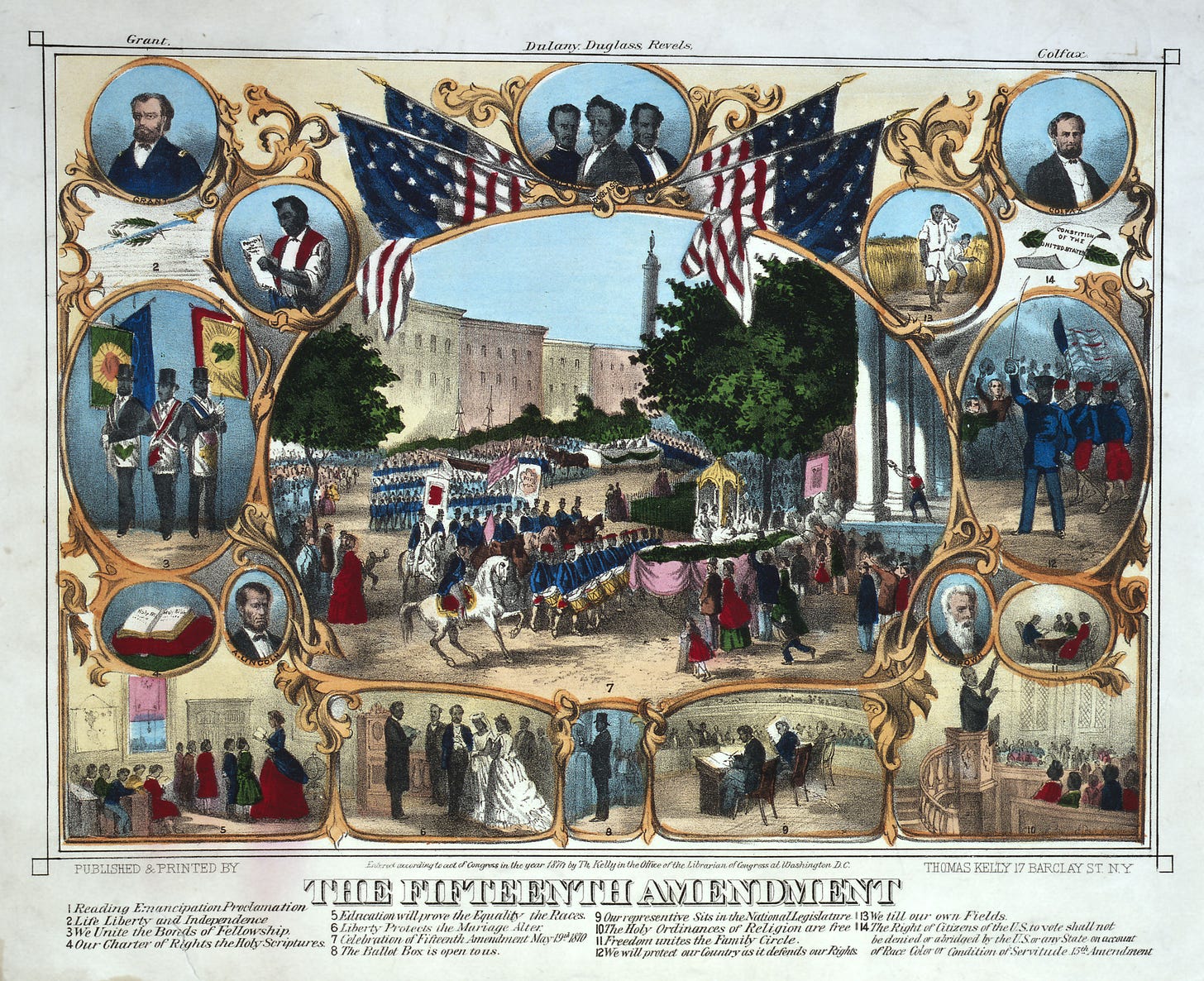TDIH: The Fifteenth Amendment
Many northern states weren’t bothering to abide by the principles being imposed on the South. Thus, while most southern states had granted black men the right to vote, most northern states had not.
On this day in 1870, Iowa ratifies the Fifteenth Amendment, thus ensuring that all men can vote, regardless of race. Women were not included in the Amendment, although many had been lobbying for equal suffrage for years.
The changes came in the wake of the Civil War.
Obviously, the country was very divided in those years. States that had been part of the Confederacy were not admitted back into the Union right away: No state could be readmitted unless it first ratified the Fourteenth Amendment and granted equal suffrage to black men within its own borders.
Interestingly, such demands were a one-way street. Many of the northern states weren’t bothering to abide by the principles being imposed on the South. Thus, while most southern states had granted black men the right to vote by 1867, most northern states still had not.
So-called Radical Republicans wanted to change this state of affairs.
The Thirteenth Amendment freed slaves. The Fourteenth Amendment guaranteed all persons the rights of citizenship. Now, these Republicans envisioned ratification of a Fifteenth Amendment, ensuring that citizens could not be denied the right to vote based on “race, color, or previous condition of servitude.”
They just needed a critical mass of northern states to get on board.
Remember, the southern states were in some ways easier. Some had already been re-admitted into the Union and had thus already granted equal suffrage to black Americans. As for the others, Congress made ratification of the Fifteenth Amendment a requirement of re-admission into the Union.
Congress had no such leverage over the northern states.
To the contrary, an interesting dilemma occurred partway through the ratification process. New York ratified the amendment in April 1869, then attempted to rescind its ratification in January 1870. Was a state allowed to do that? The issue became moot when several other states ratified the amendment in quick succession, concluding with Georgia (February 2), Iowa (February 3), Nebraska (February 17), and Texas (February 18). The Secretary of State issued his March 30 proclamation, certifying the results and putting the amendment into effect. New York soon rescinded its own rescission.
On March 30, President Ulysses S. Grant sent a message to Congress. He declared that ratification of the Fifteenth Amendment was “a measure of grander importance than any other one act of the kind from the foundation of our free Government to the present day.”
Frederick Douglass, a leader in the abolitionist movement, agreed. “The revolution wrought in our condition by the Fifteenth Amendment of the Constitution of the United States,” he wrote, “is almost startling, even to me. . . . Henceforth we live in a new world, breathe a new atmosphere, have a new earth beneath and a new sky above us. . . . Equal before the Lord, equal at the ballot-box and in the jury box . . . . We were always men—now we are citizens and men among men.”
Sources can always be found on my website, here.



The 15th was effectively negated by LBJ’s so called “Great Society Act” of 1965. NY Senator Daniel Patrick Moynihan opposed it on the floor of the senate accurately predicting that it would return the blacks to a state of servitude, this time to the Federal Government. He was correct. The very first rule issued was in the “Aid for families with Dependent Children” ADFC. If there was a man in the house there was no money. This caused the black divorce rate to soar and now we see the results.
It’s baffling that as a nation founded on freedom and liberty for all that certain groups were excluded from that idea. The question is why. The answer is because it was being formed by human beings who were not perfect, but trying to set the groundwork for a more perfect union. They managed through amendments to the constitution and by the people most affected speaking and standing up to make important changes. Keeping freedom is a constant struggle. It has to be fought for in order to preserve and protect it. The biggest threat to the Republic is human nature. It will always be a struggle to maintain a truly free country because there will always be self serving people seeking ways to destroy it.